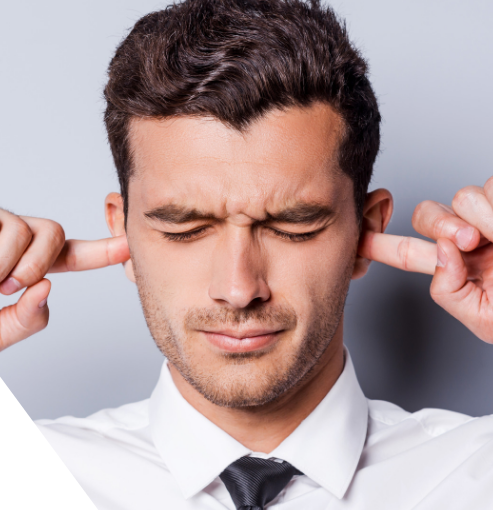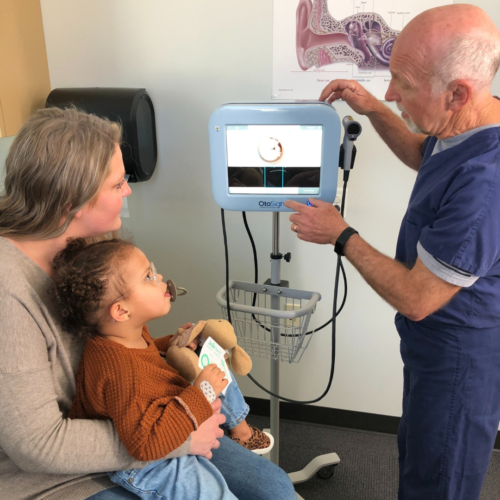Phone
866-411-EARS
Address
PhotoniCare Inc.
2800 Meridian Parkway, Suite 175
Durham, NC 27713

It’s the middle of the night, all is silent in the house except for what’s going on in your ear(s). It’s constant. It’s irritating. It’s that ringing that no matter what you try to do is always there when everything is so quiet, leaving you with so many questions. Why is it there? What could you have done to prevent it? Is there any way to cure it?
Although our technology is focused on imaging the middle ear, we often meet patients that struggle with issues affecting the inner ear. One such issue is when a patient is experiencing the ringing in his or her ears. In this blog post, we discuss what causes the annoying, and sometimes painful, reasons why you might have ringing in your ears.
What is ringing in the ear?
The sensation of hearing ringing, buzzing, hissing, whistling or any other sounds is called Tinnitus. Interesting to note, the word Tinnitus is pronounced two different ways. One pronunciation tends to sound like “TIN-ni-tus”. While the general American pronunciation often sounds like “ti-night-tus” or “tin-NYE-tus.”
Tinnitus can be intermittently heard or a continuous noise and varies in volume. While the noise is constantly occurring, many times a person who has Tinnitus will be more aware of it when the background noise is lower, hence why most people are bothered by it when trying to fall asleep. Tinnitus is incredibly common and has affected around 50 million adults in the US. For most individuals, Tinnitus is simply an annoying sound heard in the quiet, and causes little to no ear pain; however, there are severe cases that can cause individuals to experience difficulty sleeping or even concentrating and, in the more extreme cases, cause psychological distress. So, now that you have some background into what Tinnitus is, let’s look into some of the causes of that ringing in your ears.
What Causes Tinnitus
The most common cause of Tinnitus is prolonged exposure to loud noises. When a person is exposed to loud noises over a long period of time (think construction workers, pilots, musicians etc.), it causes permanent damage to the sound-sensitive cells within the cochlea. Along with prolonged exposure, a single exposure to an extremely loud and jarring noise can also cause Tinnitus.
While noise plays a key role, other factors can also cause Tinnitus, including the following:
Tinnitus symptoms can often worsen from use of alcohol, smoking cigarettes, eating certain foods, and even experiencing stress and fatigue.
Tinnitus Treatment
Now that you know what it is and what causes it, let’s talk about some ways to treat Tinnitus. The first step in treatment – and most important – is figuring out what is causing the ringing sound. If you find that the cause of your Tinnitus is an underlying health or medical condition, your first step should be to address that condition. If, instead of an underlying health issue, the problem is simply excessive earwax, you will need your healthcare provider to clean out your ears. Once that is completed, the noise may go away completely, or at least be considerably toned down.
There are certain medications that can also treat Tinnitus. Anti-anxiety drugs – Valium or antidepressants like Elavil – have been known to help reduce the effects of Tinnitus. Also, the use of steroids placed in the middle ear can also help reduce the effects of Tinnitus.
For most people, Tinnitus is caused by noise exposure, so a natural remedy is to use masking devices. The use of hearing aids or Tinnitus Maskers – devices that play a sound more soothing and pleasant than the internal ringing – help deaden the noise made by Tinnitus and can help the affected person cope easier.
Tinnitus is a common condition that most people live with every day. You can try to avoid this condition by avoiding loud noise exposure altogether; however, your ear health may not be horribly altered by Tinnitus. By making changes to your daily life, you can learn to live and cope with Tinnitus without experiencing any detrimental side effects or further ear pain. Some of these changes may be minor, like adding soothing sounds to silence to avoid hearing the ringing, while other changes may be more drastic, like quitting smoking or drinking alcohol; however, when it comes to maintaining ear health, any measure is worth it.

The COVID-19 pandemic has created numerous challenges for parents. Navigating… Read More

PhotoniCare sits down with Dr. Michael Novak, an Ear, Nose… Read More

This week on the #EnginEarGuys blog we talk about otolaryngology… Read More